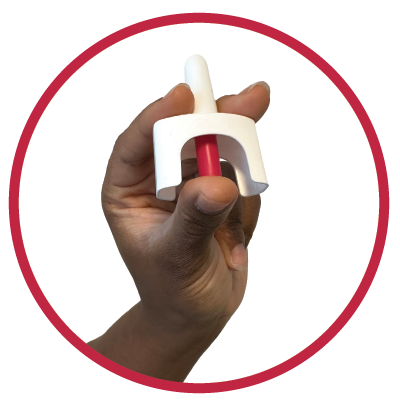
Opioids and Overdose Prevention
Help save a life. Reverse an overdose. Carry naloxone.
Naloxone is a medication that can reverse the effects of an overdose.
 Naloxone is given when someone is having a suspected overdose on opioids. Naloxone can help the person start breathing and wake up again.
Naloxone is given when someone is having a suspected overdose on opioids. Naloxone can help the person start breathing and wake up again.- More than one dose of naloxone may be required depending on the amount of opioid the person has overdosed on.
- Naloxone is given by nasal spray or needle.
- Naloxone is free without a prescription.
- Naloxone kits and training on how to use them are available at some drug stores and community agencies including John Howard Society of Durham and Durham Community Health Centre.
| Who is eligible for a free kit? |
|
You are eligible for a free kit if you are:
|
| Community agencies |
|
Are you a community agency interested in distributing naloxone kits to your clients? Find more information at durham.ca/ONP. |
Durham Region Opioid Information System
People who use drugs are real people.
The opioid crisis continues to impact individuals and families across the Region.
Watch our video series to learn more about what is happening in Durham Region and how you can help.
Get informed. Get involved. Get help.
The opioid crisis is a complex public health issue. There are many factors that have led to an increase in opioid-related overdoses. This includes high rates of opioid prescribing and the presence of strong opioids in the illegal drug supply - such as fentanyl.
- Since 2015, the number of emergency department visits due to an opioid overdose in Durham Region increased from 231 in 2015 to 544 visits in 2024.
- The number of Durham Region opioid related deaths increased from 29 in 2015 to 97 deaths in 2024 (Durham Region Opioid Information System, 2025).
Get informed: opioids and overdose awareness
Opioids are prescription drugs that are usually prescribed to treat moderate to severe pain. Other uses include controlling coughs and diarrhea. For some people, opioids can cause euphoria or a "high" which can make them addictive.
There are many different types of opioids that can range in strength. Common opioids include:
- Fentanyl
- Oxycodone
- Hydromorphone
- Morphine
- Codeine (found in Tylenol 2, Tylenol 3, Tylenol 4)
- Methadone
- Heroin
Opioids come in many different forms such as:
- Tablets or capsules
- Skin patches
- Syrups
- Liquid for injection
- Nasal spray
Do not take medication that has not been specifically prescribed for you.
| What are counterfeit prescription drugs? |
These pills are made to look like real prescription medication but are not made under regulated standards and/or in legal environments. They can be mixed with unknown chemicals and/or unknown amounts of opioids such as fentanyl or carfentanil, which can be deadly. |
| What are the effects of opioids? |
|
Opioids can suppress the sensation of pain. Other effects of opioids can include:
Higher doses of opioids can cause more intense and longer lasting effects. An overdose can occur if someone takes more opioids than their body can handle. |
|
Opioids and pregnancy |
|
| What is fentanyl? |
|
Fentanyl is a type of opioid. It is 50 to 100 times stronger than morphine. Even a small amount of fentanyl can cause an overdose. This amount can be as small as two grains of salt. What is carfentanil? Carfentanil, is an even stronger opioid, approximately 100 times stronger than fentanyl and 10,000 times stronger than morphine. Fentanyl and carfentanil are often mixed with other street drugs such as cocaine, cannabis, heroin and ecstasy. |
| What is xylazine? |
|
| Signs of an overdose |
|
All types of opioids have a risk of overdose, which can lead to respiratory distress (having trouble breathing). An overdose on opioids can include any of these signs or symptoms:
An overdose is a medical emergency. If you think someone has overdosed on opioids, call 911 immediately. Even if naloxone was given, call 911 as naloxone may wear off and overdose symptoms can return. |
| How to respond to an overdose |
|
5 steps to save a life:
|
| How to prevent an overdose |
|
If you or someone you know has an opioid use disorder, consider using the following overdose prevention tips:
|
| Where to get a free naloxone kit |
|
Naloxone is a medication that can reverse the effects of an overdose.
You are eligible for a free kit if you are:
Community agencies Are you a community agency interested in distributing naloxone kits to your clients? Find more information at durham.ca/ONP. |
| What is the Good Samaritan Drug Overdose Act? |
The act can protect you from:
The act does not provide legal protection against more serious offences, such as:
|
|
What is abstinence and harm reduction? |
|
Abstinence is avoiding use of a drug or substance (Health Canada, 2022). Abstinence may be the right choice for some but may not be a realistic or desirable goal for others. If a person who uses substances chooses to work toward abstinence, it is important that they are told about the potential risks of abstinence, and offered support and interventions based on best practices, current evidence, and their unique needs. Seeking abstinence is compatible with a harm reduction approach, which supports people in defining their own goals. Harm reduction is an evidence-based, public health approach that aims to reduce the negative health, social, and economic impacts of substance use, without requiring or promoting abstinence (Government of Canada, 2023). |
| What is recovery-oriented care? |
|
A recovery-oriented approach uses strategies to empower people to use their strengths and skills to help them lead the life that they choose when experiencing substance use and mental health issues |
| Always return unused or expired opioid prescriptions |
In 2017
Keep your family safe and return your expired/unused prescriptions to any pharmacy. Do not flush prescriptions down the sink or toilet. Patch for Patch Program (P4P) People with opioid patch prescriptions must return their used patches to their pharmacy to get new ones. Used patches can be dangerous to the environment, to children and to animals. Do not flush or throw out the patch. |
Get involved: the harms of stigma and what you can do about it
Stigma is negative thoughts or beliefs about a group of people based on their life circumstances. It can involve judging, labelling and stereotyping.
Why does it matter?
Stigma can have a major impact on the lives of people who use drugs and their families. "Stigma can destroy self-esteem and relationships, make it harder to access treatment, jobs and housing, and leads to discrimination and isolation" (Health Canada, 2022).
Stigma creates barriers and prevents people who use drugs and their families from getting the help they need. Help end stigma in Durham Region.
|
What can I do to help end stigma? |
Why language matters? Stigma can be reduced by changing the language we use. For example:
|
| Trauma and violence informed approaches for service providers |
|
Many people who use substances will share that they have experienced trauma or violence at some point in their life. This could include abuse or neglect, physical or sexual violence, accidents and sudden unexpected loss. For some, these experiences affect their ability to cope and they resort to substances as a coping strategy, making them at risk for substance use problems. What is a trauma and/or violence informed approach? Trauma and violence informed approaches, recognizes the connections between violence, trauma, negative health outcomes and behaviours (Health Canada, 2018). It recognizes an understanding of trauma in all areas of service delivery and places a priority on the trauma survivor’s:
What can you do? Any time you are engaging with other people, recognize that trauma and violence:
Many trauma survivors who use substances to cope are at risk of being re-traumatized and struggle to access supports. Taking a trauma and violence informed approach in all interactions with other people can help reduce these risks and promote recovery for trauma survivors. Helpful tips for taking a trauma and violence informed approach:
For more information on trauma and violence informed approaches check out the Government of Canada’s web page on trauma and violence informed approaches to policy and practice and Alberta Health Services e-learning modules on trauma informed care. |
Get help: addiction and mental health services
Substance use disorders
A substance use disorder is a medical condition, deserving of care just like any other health condition or disorder. When someone is affected by a substance use disorder they have powerful craving for the drug and continue using it despite the harms it causes.
Using substances can cause changes in the brain and body that can make it hard to stop using the substance. People who develop a physical dependence to the drug can experience symptoms of withdrawal when they stop using. Learn more about abstinence and harm reduction. Recovery from a substance use disorder is possible with recovery-oriented care.Recovery from a substance use disorder is possible.
| Where can I get help? | ||
Crisis services
Lakeridge Health Corporation:
Uxbridge site: 4 Campbell Dr, Uxbridge, ON L9P 1S4 Counselling and treatment servicesRapid Access Addiction Medicine (RAAM) clinics in Durham Region (Lakeridge Health) offer fast access to quality care on a walk-in basis for people living with alcohol and opioid-related addictions. Services include medical treatment and same-day counselling services without a doctor’s referral. Pinewood Centre of Lakeridge Health offers inpatient and outpatient assessment and treatment for mental health and addiction issues. Durham Community Health Centre offers counselling and programs for mental health concerns and addictions. Canadian Mental Health Association provides a broad range of mental health services. Durham Mental Health Services provides services to teenagers 16 years of age and older who are dealing with mental health issues and substance abuse. John Howard Society of Durham Region provides referrals and support to navigate addictions, medical, and mental health services through our Harm Reduction Programs. ConnexOntario provides free and confidential health services information for people experiencing problems with alcohol and drugs, mental illness and/or gambling. The information and referral service is live-answer 24/7, confidential, and free. Frontenac Youth Services offers a mental health crisis hotline and school services to youth who are 12 to 18 years of age within Durham Region. This organization also provides substance abuse treatment for youth. 211 is a free, multilingual, 24/7 helpline answered by community navigators who help callers connect with services and programs in their community. The helpline is supported by an online database of community, social, health and government services. Narcotics Anonymous (Central Lake Ontario Area branch) provides resources on alcohol and other drugs. Afridi Medical Clinic offers outpatient assessment and treatment for addictions. Treatment services also provided for concurrent mental health disorders and chronic Hepatitis C infections. Referral required. |
||
| Harm reduction services | ||
Project X-ChangeGoals of the program:
The program provides access to:
|
| Important links |
Contact Us




